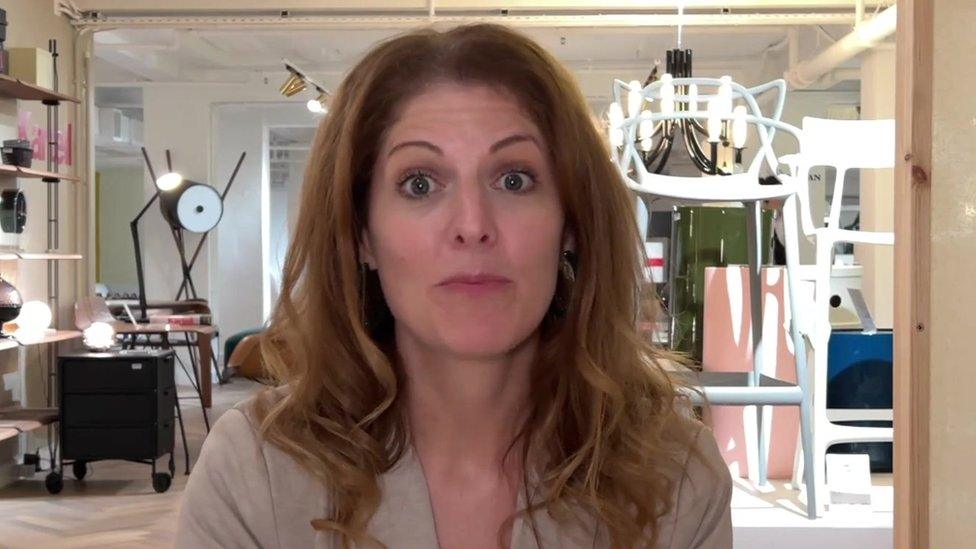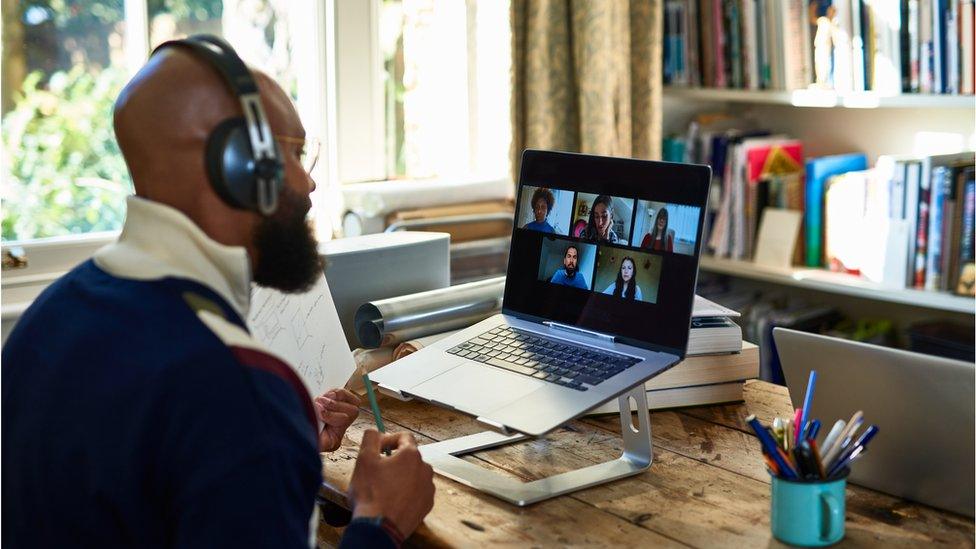Will the five day-office week make a return?
- Published

More than half of professional Londoners are working in a hybrid way and 56% say they would not accept a job that does not offer that flexibility, a survey has found.
The study by recruitment company Hays found that 18% were working fully remotely.
This type of working has changed the lives of some Londoners post-pandemic.
Irene Poku, an executive coach, told the BBC that before the pandemic she would sometimes travel two hours each way to work with clients in their offices but now she does her sessions online.

Irene Poku says online working has cut down on her travelling
She says this works "perfectly" as it allows her to see more clients and balance family life.
Similarly, Kiranjot, a kundalini yoga teacher, used to travel between studios to teach but now runs a subscription based service.
"It's something I can scale, it doesn't matter if I'm teaching 20 people or 200 or 2,000, the one class is still the same I can reach many more people," she says.
"I teach people from all around the world."
Remote working gathered pace during the pandemic when people were told to work from home and many workers are now resisting a return to five days at the office.

Kiranjot has been able to expand her client list with online classes
Deirdre Mc Gettrick is founder of a technology company, and she too handed back the keys to her office when the pandemic started.
She runs ufurnish, a furniture search website, with her team of 15 operate remotely who are allowed to work from abroad for up to a month a year.
Ms Mc Gettrick runs the business from Australia, Portugal and Ireland and says she trusts staff to manage their own time but there are core hours so employees can have meetings.

Deirdre Mc Gettrick says remote working enabled her to be competitive in hiring
She said: "Flexible working enabled us to get talent in a much more competitive environment than if you are just competing in places like London, but on the downside you do lose out that brainstorming, energy and motivation that comes from coming together."
Midweek office peak
Data from Freespace, a firm that connects people, space and activity to achieve better outcomes for businesses, suggests offices were, on average, about 70% full on Tuesdays, Wednesdays and Thursdays in September 2019.
In September this year, they were about 50% full.
Mondays and Fridays already saw lower attendances in the office even pre-pandemic but now it's much lower, with just 14% office occupancy on an average Friday in September.
Freespace CEO Raj Krishnamurthy says the midweek is getting busier in the capital.
"We expect this trend to continue for the foreseeable future and probably coming back to pre-pandemic levels soon," he says.
He says his clients do want staff to come back in to the office but aren't forcing the issue.

Working from home concept saw its biggest boost during the pandemic lockdowns
A number of the capital's corporates now require this but some cases there has been pushback.
Some parents have built their lives around a flexible approach to working and believe they are more productive working this way.
Kimberley Whitaker, a senior lawyer and single parent, withdrew from a recruitment process when the company said the role was office-based five days a week.
"At that point I had a sinking feeling and I just thought this isn't going to work," Kimberley says.
'Great equaliser'
She says she's happy to go in to the office a couple of days a week and believes the pandemic showed people could more productive while working remotely.
BBC London's Tarah Welsh looks at how different styles of working has changed the lives of some Londoners post-pandemic
Kimberley adds: "I don't know why we would go back on something like that. In my view it has been a really great equaliser for people with caring responsibilities, mobility issues or people that can't afford to live near to their work."
The Hays survey suggests that 69% of employers in London are offering hybrid working and over a fifth of those (21%) said their offering was flexible and staff could choose how many days they work remotely.
But it also suggested 28% of companies offering hybrid working will expect staff to be in the workplace more often over the next 12 months.
A group of MPs recently heard evidence that women were particularly affected by scaling back flexible policies.
Fiona Mackenzie, chief executive of the think tank the Other Half, told the Treasury Committee: "There are women all over the City who are now working their notice, who have left jobs where they were high-calibre performers because hybrid working enabled them to stick in those roles.
"There are leaders who are tearing their hair out because they know that they are losing great people due to these decisions to switch off hybrid working."
How productive people are when working from home is still being debated, with employers and employees sometimes having different perspectives.
'Work from home sweet spot'
André Spicer, professor of organisational behaviour at Bayes Business School at City, University of London, says: "I think a lot of managers who can't see their employees actually doing anything tend to think they're doing nothing. But that's not the reality.
"Actually, a lot of research tends to suggest that if people are at home sometimes they can focus more and actually be more productive working at home rather than in the office."
He says according to global research, two to three days of work in the office combined with working at home is the "sweet spot"
Paul Swinney, the director of policy and research at think tank Centre for Cities, says evidence is emerging that businesses are having a "productivity hit".
He says: "If we think that [...] that face-to-face interaction is an important way we do our jobs, there is potentially going to be a drop-off in terms of how well people function, how our companies function, and then how well the London economy functions."
A company that is a champion of hybrid work is one of the technology giants that helped connect employees when many of them did have to work at home - Zoom.
Staff there are required to work in its central London office two days a week.
It says it's designed its offices to cater to flexible working, and staff get perks like free food and a modern space to try and draw them in. It says businesses now need to "earn the commute".
Whatever the future holds, one thing that seems certain is that people will continue to look unfavourably on employers that don't offer their staff flexibility.